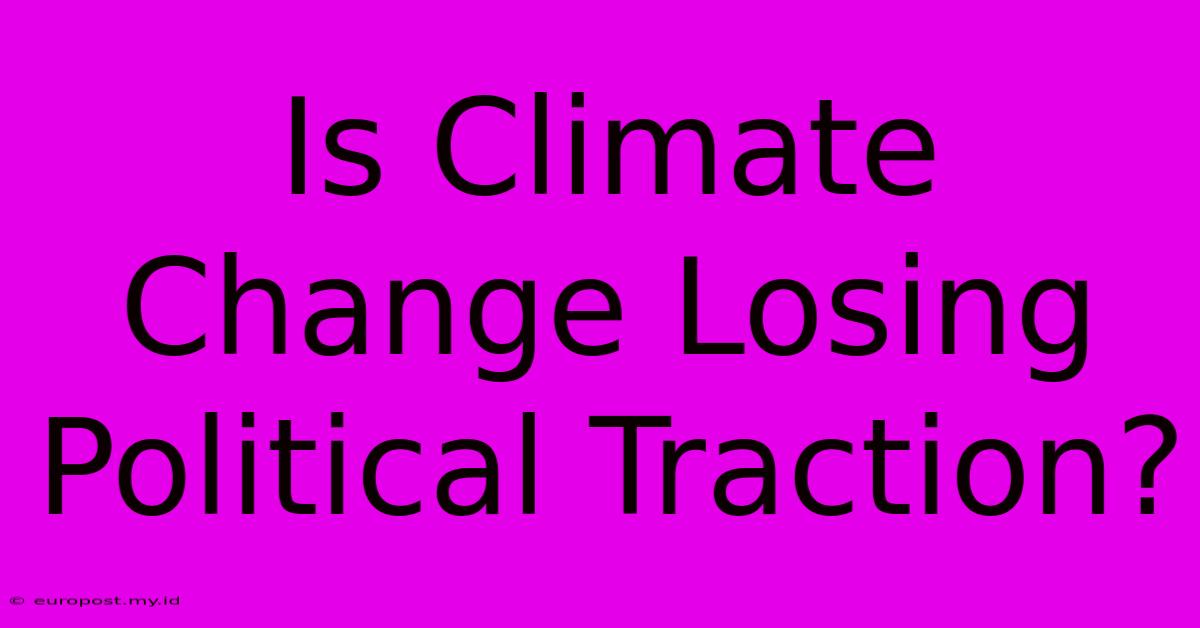Is Climate Change Losing Political Traction?

Discover more in-depth information on our site. Click the link below to dive deeper: Visit the Best Website meltwatermedia.ca. Make sure you don’t miss it!
Table of Contents
Is Climate Change Losing Political Traction?
The fight against climate change has seen significant highs and lows. While awareness has undeniably grown, the urgency and political will behind tackling this global crisis seem, at times, to waver. Is climate change losing political traction, or are we simply witnessing a temporary lull in the storm? This article delves into the complexities of this question, examining both the perceived setbacks and the persistent forces driving climate action.
The Shifting Sands of Political Priorities
One of the most significant challenges facing climate action is the constantly shifting landscape of political priorities. Economic downturns, national security concerns, and social issues often overshadow environmental considerations, especially in the short term. Short-term economic gains can easily outweigh long-term environmental sustainability in the eyes of some policymakers, leading to delays or even reversals in climate-friendly policies. This is particularly true in countries heavily reliant on fossil fuels, where the economic implications of transitioning to renewable energy sources are acutely felt.
The Influence of Lobbying and Disinformation
Powerful lobbying groups representing fossil fuel industries continue to exert significant influence on political decision-making. These groups often employ sophisticated strategies to downplay the severity of climate change, spread misinformation, and lobby against climate regulations. This calculated effort to sow doubt and delay action undermines the efforts of climate activists and scientists, creating a challenging environment for meaningful policy changes. Combating misinformation and the influence of these groups is crucial for maintaining political momentum.
Signs of Continued Momentum: A Counter-Narrative
Despite the apparent setbacks, it's crucial to acknowledge the ongoing efforts and successes in the fight against climate change. The global growth of renewable energy sources is a testament to the increasing economic viability and technological advancements in this sector. Renewable energy investments are soaring, demonstrating a growing confidence in a sustainable future.
Growing Public Awareness and Activism
Public awareness of climate change is also steadily increasing. Younger generations, in particular, are increasingly vocal in their demands for climate action, exerting pressure on governments and corporations to adopt more sustainable practices. Youth climate activism, such as the Fridays for Future movement, has played a crucial role in keeping climate change at the forefront of public discourse.
International Cooperation and Agreements
While implementation remains a challenge, international agreements like the Paris Agreement represent a significant commitment to global climate action. These agreements provide a framework for cooperation and collaboration, setting targets and encouraging countries to develop and implement their own climate policies. The ongoing negotiations and updates to these agreements demonstrate a continued effort towards international cooperation, even if progress is uneven.
The Road Ahead: Maintaining Momentum
The question of whether climate change is losing political traction is not a simple yes or no answer. While there are undoubtedly challenges and setbacks, the momentum for climate action remains strong in many parts of the world. Maintaining this momentum requires a multi-pronged approach:
- Strengthening international cooperation: Continued collaboration and support between nations are vital for achieving global climate goals.
- Combating misinformation and lobbying: Effective strategies are needed to counter the influence of vested interests and promote accurate information about climate change.
- Investing in renewable energy and sustainable technologies: Promoting the economic viability and accessibility of green technologies is key to driving the transition away from fossil fuels.
- Empowering youth and public engagement: Continued public pressure and activism are essential to maintaining political will and pushing for ambitious climate policies.
Ultimately, the fight against climate change is a marathon, not a sprint. While there may be periods of slower progress, the long-term trend towards increased awareness, technological innovation, and international cooperation suggests that climate change will continue to be a central political issue for the foreseeable future. The challenge lies in maintaining the urgency and sustained effort required to avert the most catastrophic consequences of climate change.

Thank you for taking the time to explore our website Is Climate Change Losing Political Traction?. We hope you find the information useful. Feel free to contact us for any questions, and don’t forget to bookmark us for future visits!
We truly appreciate your visit to explore more about Is Climate Change Losing Political Traction?. Let us know if you need further assistance. Be sure to bookmark this site and visit us again soon!
Featured Posts
-
Uk Tv And Streaming Scotland Vs Croatia
Nov 16, 2024
-
Nayantharas Honest Open Letter
Nov 16, 2024
-
Philippine Navys Strategic Pivot
Nov 16, 2024
-
Bi Analytics Software Market Demand Analysis
Nov 16, 2024
-
Tysons Florida Life Kids Sports
Nov 16, 2024
